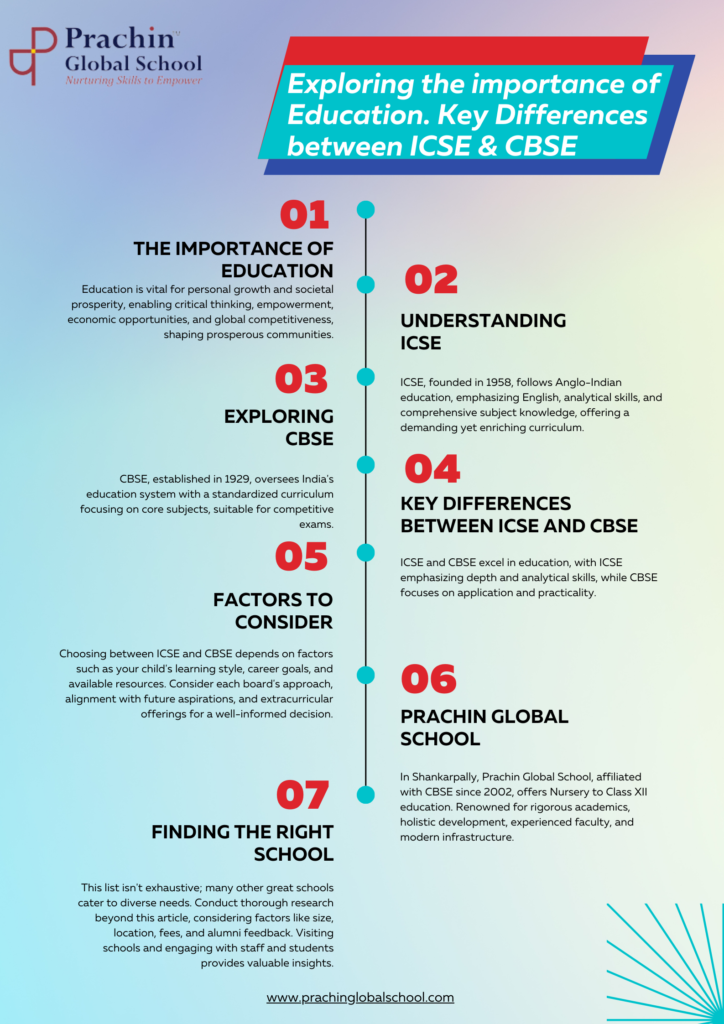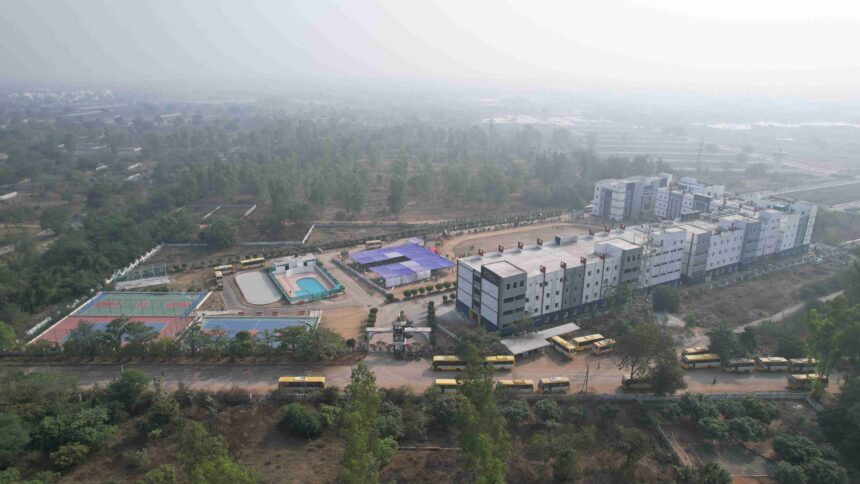In today’s rapidly evolving world, education holds paramount importance. It empowers individuals, unlocks economic opportunities, and fuels societal progress. Choosing the right education system is crucial for shaping the future of young minds. This blog explores the significance of education and delves into the two prominent educational systems in India: the Indian Certificate of Secondary Education (ICSE) and the Central Board of Secondary Education (CBSE).
The Importance of Education
Education is the cornerstone of personal development and societal well-being. It equips individuals with the knowledge, skills, and values needed to navigate life successfully.
- Empowerment and personal development:
Education fosters critical thinking, problem-solving abilities, and effective communication skills. It empowers individuals to make informed decisions, build self-confidence, and reach their full potential.
- Economic opportunities and career advancement:
Education equips individuals with the skill sets and qualifications necessary to secure well-paying jobs and advance in their chosen careers. It opens doors to higher education and specialized training, paving the way for greater financial security and professional fulfillment.
- Societal progress and global competitiveness:
Education is the bedrock of a thriving society. It fosters informed and responsible citizens who contribute meaningfully to the economy and community. In a globalized world, a well-educated population is crucial for national development and global competitiveness.
Understanding ICSE (Indian Certificate of Secondary Education)
The ICSE is an internationally recognized board that follows a curriculum based on the Anglo-Indian education system.
- History and background:
Established in 1958, the ICSE primarily caters to schools affiliated with Anglo-Indian communities. It follows a rigorous curriculum with a strong emphasis on English language, analytical thinking, and in-depth subject knowledge.
- Curriculum structure and examination system:
The ICSE curriculum offers a broad range of subjects, including English, Mathematics, Science, Social Sciences, Humanities, and electives. Examinations are conducted at the end of each academic year, with external examiners marking the papers.
- Advantages and drawbacks:
The ICSE curriculum fosters well-rounded development, with a focus on creativity, critical thinking, and subject mastery. However, it can be considered more demanding with a potentially higher workload compared to the CBSE system.
Exploring CBSE (Central Board of Secondary Education)
The CBSE is the national board of education for India, governing a large number of schools across the country.
- Evolution and establishment:
Established in 1929, the CBSE aims to provide standardized education across the nation. It offers a curriculum aligned with the National Curriculum Framework (NCF) of India.
- Curriculum design and assessment methods:
The CBSE curriculum focuses on core subjects like English, Mathematics, Science, and Social Sciences. While offering some elective options, it generally has a narrower scope compared to ICSE. Internal assessments and board examinations contribute towards the final grades.
- Pros and cons:
The CBSE curriculum is known for its straightforward approach and focus on application-based learning. It is considered well-suited for students aiming for competitive entrance exams after Class 12. However, the system might be perceived as less comprehensive in terms of subject exploration compared to ICSE.
Key Differences Between ICSE and CBSE
Both ICSE and CBSE offer quality education, but they differ in certain key aspects:
- Academic rigor and flexibility:
The ICSE curriculum delves deeper into subjects, offering more content and potentially demanding greater effort from students. CBSE, on the other hand, emphasizes application and may offer slightly less content compared to ICSE.
- Examination patterns and grading systems:
ICSE relies primarily on external examinations for final assessment, while CBSE incorporates internal assessments along with board exams. Additionally, grading scales might differ slightly between the two boards.
- Focus areas and teaching methodologies:
ICSE emphasizes analytical thinking, in-depth subject knowledge, and diverse subject offerings. CBSE focuses equally on core subjects and practical application, potentially with a slightly narrower subject range compared to ICSE. Teaching methodologies may also vary between schools affiliated with each board.
Factors to Consider When Choosing Between ICSE and CBSE
The choice between ICSE and CBSE depends on various factors:
- Individual learning preferences and aptitudes:
Consider your child’s learning style, strengths, and interests. For instance, if your child thrives in a challenging and comprehensive environment, ICSE might be a good fit. Conversely, if your child prefers a more streamlined approach with a focus on application, CBSE could be suitable.
- Future academic and career aspirations:
If your child aims for competitive entrance exams after Class 12, the CBSE curriculum might be considered a good starting point due to its alignment with entrance exam patterns. However, if your child is undecided about future aspirations, the broader subject exposure offered by ICSE could be beneficial.
- Availability of resources and extracurricular opportunities:
Research schools affiliated with each board in your preferred location. Consider factors like proximity, infrastructure, teacher-student ratio, and available extracurricular activities that align with your child’s interests.
Example of Top Schools in Hyderabad:
Prachin Global School, Hyderabad:
Located in Shankarpally, Prachin Global School is a co-educational day school affiliated with the CBSE board. Established in 2002, the school offers classes from Nursery to Class XII and is known for its:
- Strong academic foundation: The school follows a rigorous curriculum with a focus on developing critical thinking, analytical skills, and subject mastery.
- Holistic development: Beyond academics, the school emphasizes co-curricular activities, sports, and value-based education to foster well-rounded individuals.
- Experienced faculty: The school boasts a team of qualified and experienced teachers dedicated to providing personalized attention to students.
- Modern infrastructure: The school features well-equipped classrooms, laboratories, a library, and various sports facilities.
Finding the Right School:
Remember, this list is not exhaustive, and numerous other excellent schools cater to different needs and preferences. It’s crucial to conduct thorough research beyond this article, considering factors like school size, location, fees, and alumni testimonials. Visiting schools and interacting with educators and students can also offer valuable insights into the school culture and learning environment.
Conclusion
Choosing the right educational path for your child is a significant decision. By understanding the nuances of ICSE and CBSE, researching available schools, and considering your child’s unique needs and aspirations, you can empower them to embark on a fulfilling and enriching educational journey.


